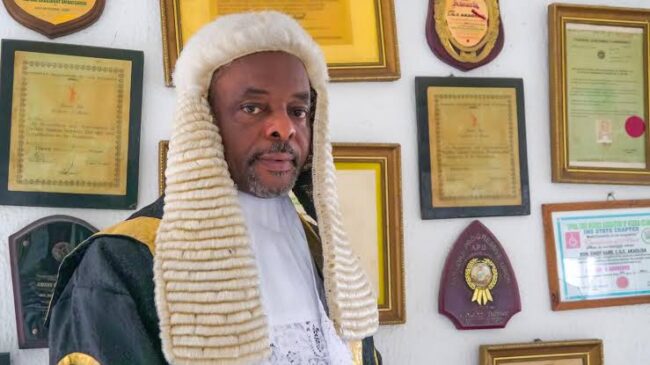
A storm of controversy continues to engulf the Imo State Judicial Service Commission, with fresh allegations and speculations intensifying following the abrupt removal of the state’s Attorney-General and Commissioner for Justice, Barr C.O.C. Akaolisa, on Monday, May 26, 2025.
The dismissal, announced by the Commissioner for Information, Public Orientation, and Strategy, Hon Declan Emelumba, comes on the heels of Akaolisa’s provocative statement at the Nigerian Bar Association (NBA) Owerri Law Week opening ceremony on May 21, 2025, where he likened a “virus” (Judiciary Virus – “J Virus” for short) to the turmoil plaguing the state’s judiciary. In his address, Akaolisa claimed that this so-called “virus” was responsible for the removal of the former Chief Judge of Imo State, Hon. Justice Theresa Chikeka, in November 2024, following allegations of age falsification. The National Judicial Council (NJC) had directed her dismissal after a petition by the Civil Society Engagement Platform (CSEP) exposed discrepancies in her date of birth, which was allegedly altered from October 27, 1956, to October 27, 1958.
The former Chief Judge was accused of unlawfully extending her judicial tenure beyond the mandatory retirement age, a move that sparked widespread outrage and led to her ouster.
Akaolisa further alleged that the same “virus” (J Virus, if you like) is now targeting 18 other judges in the Imo State Judiciary, who are currently under NJC investigation for similar allegations of age falsification and misconduct.
According to a petition filed by CSEP, these judges are accused of manipulating their ages to secure appointments and prolong their tenures, undermining the integrity of the judiciary. The NJC has summoned these judges to Abuja, with proceedings ongoing to determine their fate.
However, the plot thickens with whispers of a deeper conspiracy. Sources within the judiciary suggest that the Imo State Judicial Service Commission (JSC) secretary, Mrs. Jennifer Nwosu, is at the center of the scandal, allegedly leaking official documents to her husband, who is rumored to be operating under the guise of CSEP – an unregistered association.
During NJC hearings, a man reportedly claimed authorship of the petition against the 18 judges, adopting it as his own, fueling speculation that he is the JSC secretary’s husband.
These allegations have raised serious questions about the misuse of confidential judicial records and the motives behind CSEP’s aggressive campaign against the Imo Judiciary.
The sacked Attorney-General’s reference to a “virus” (J Virus) pursuing not only the former Chief Judge and the 18 judges but also some staff of the JSC who have connection with Judges already under the attack of the J virus, and more recently, Magistrates in Imo State (whose files have not been called up for intense scrutiny), has ignited public speculation. Many now believe that Akaolisa’s removal is no coincidence but rather a consequence of his outspoken comments, possibly orchestrated by the same forces he metaphorically described as “virus.”
The Imo State Government’s announcement, signed by Hon Declan Emelumba, offered no specific reason for Akaolisa’s dismissal, stating only that he must hand over all government property to the State Solicitor-General and Permanent Secretary of the Ministry of Justice immediately.
Critics argue that the lack of transparency in Akaolisa’s removal only fuels suspicions of a cover-up. “If this is just a reshuffle, why the urgency? Why no explanation?” questioned a lawyer who spoke to bibncollar.com on conditions of anonymity.
In another’s view, “The Attorney-General’s ‘virus’ comment struck a nerve, and now he’s out. It’s hard not to see a connection. Same virus has attacked him.”
The CSEP, led by figures like Comrade Onyebuchi Emmanuel and Ndubuisi Onyemaechi, has positioned itself as a watchdog against judicial corruption, claiming to have uncovered an “unprecedented age falsification scandal” in Imo State. However, their methods, particularly the alleged involvement of the JSC secretary’s husband, have drawn scrutiny.
Legal analysts argue that if these claims are substantiated, they could point to a coordinated effort to destabilize the judiciary, possibly for political or personal gain, especially with strong indications that the JSC secretary is desirous of creating vacancy in the judiciary for herself and friends in the magistracy.
The NJC’s handling of the matter will be critical in restoring public confidence. Past actions, such as the compulsory retirement of judges in Niger and Yobe States for similar offenses, suggest that the council may take a hardline stance.
Meanwhile, Governor Hope Uzodimma’s administration faces mounting pressure to address the crisis transparently, especially after the controversial appointment and subsequent reversal of Justice Theophilus Nzeukwu as Acting Chief Judge, which the NJC deemed unconstitutional.
As the saga unfolds, the Imo State Judiciary remains under a cloud of suspicion, with the “virus” metaphor taking on a life of its own.
Whether it represents systemic corruption, a vendetta, or a clash of powerful interests, one thing is clear: the battle for the soul of Imo’s judiciary is far from over.




